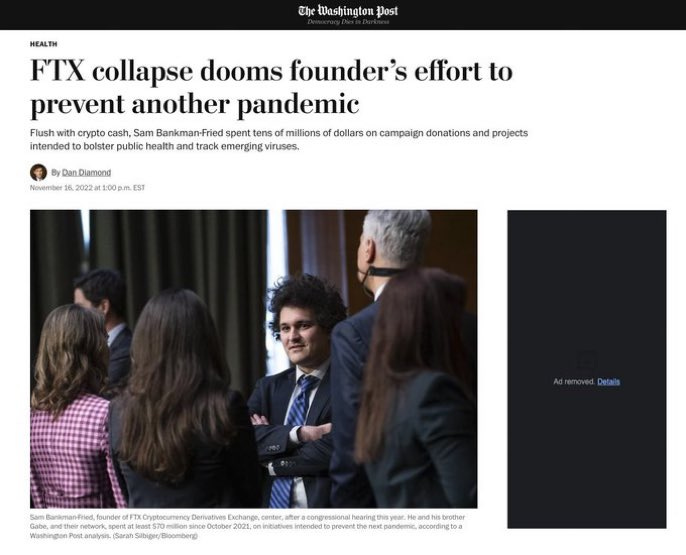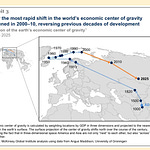A version of this essay was published by firstpost.com at https://www.firstpost.com/world/ftx-saga-and-many-implosions-in-us-especially-in-big-tech-11709111.html
Elizabeth Holmes, the formerly celebrated founder of Theranos, got hit with a jail term of 11 years, according to the Wall Street Journal. That was a startling end to what looked at one time like a huge Silicon Valley success story.
But it was not the only Big Tech or big company story. The following stories also come from the WSJ:
Along with these, there have been stories about massive layoffs: Meta axes 13% of its workforce, or about 11,000 people; Amazon lays off 10,000 staff, mostly those in core areas such as engineering and marketing; and Google (Alphabet) is under pressure from activist investor TCI to do much the same for cost-cutting reasons.
All this may add up to a “techno-winter” (if not a general recession), one might think; surely the “crypto-winter” is already in progress. But is that really true? I believe there are three separate things going on, and it does not make sense to mingle all of them and seek solutions. The first is just plain old-fashioned grift; the second is the normal churn in business models; and the third is whether crypto makes sense.
There are always major scams in the US: examples include Enron, Bernie Madoff, and the Lehman Brothers meltdown. There is the spectacle of supposedly sensible people (e.g. bankers and venture capitalists) being completely bamboozled by a smooth-talking person with a spreadsheet, with the result that lots of investor’s (and taxpayers’) money goes down the drain.
Elizabeth Holmes seems to have hoodwinked the whos-who of not only Silicon Valley’s VCs, but also name-brand politicians and captains of industry and got them on her board of directors. I mean, George Schulz and Henry Kissinger: it doesn’t get any bigger than this. Exactly what did these luminaries see in the company? Some earth-shaking vision, I suppose.
To be honest, I too wondered if Theranos did have a really disruptive technology that would upend the market for diagnostic blood tests. But after an expose in Bad Blood by a WSJ reporter, it was clear that the company was really a house of cards (see my column on this in Open Magazine, where I explored, among other things, Holmes’ ‘reality distortion field’).
It is now clear that Theranos was a scam built up by Holmes and her then-boyfriend, Ramesh ‘Sunny’ Balwani, a Pakistani-American entrepreneur who was much older than her, who was also president of the company. Holmes got sentenced to 11 years, Balwani got 13. Bernie Madoff, and Jeff Epstein also got long sentences. Bernie Madoff is a champion of sorts, for he ran the largest Ponzi scheme in history: $64 billion.
Now Sam Bankman-Fried is giving Madoff a run for his money. His crypto exchange, FTX, valued at $32 billion just a fortnight ago, is worth virtually nothing at this time, and billions of dollars worth of customers’ money has… disappeared. John Ray III, the lawyer brought in to clean up FTX during bankruptcy proceedings (ironically the same person who did the Enron clean-up), said he couldn’t believe the ‘unprecedented mess’ he found there.
The point is that despite all the fuss about crypto-currency, it is increasingly evident that Sam Bankman-Fried ran an old-fashioned fraud: “pump and dump”. The crypto bit was merely window-dressing to give sex appeal to the whole gig. And it worked, too. Major investors like the blue-chip VC firm Sequoia Capital were so thoroughly taken in that the purported reactions of their partners is simply astonishing, if true.
Here’s a screenshot of an alleged Sequoia memo. There’s worse: another tweet purports to show that two partners, a male and a female, reported being sexually aroused on hearing Bankman-Fried’s pitch about FTX’s world-beating vision to control all money (it is too embarrassing and too crude to quote):
Is crypto a scam? Stephen Diehl, author of Popping the Crypto Bubble says so in this interview with the Financial Times. He calls post-2016 crypto the Grifter Era, and that’s not far from the truth. It’s like the carpetbaggers have arrived and set up shop. I am personally of the opinion that crypto may have some value, only that the killer apps haven’t been dreamt up yet; I do believe the underlying blockchains are useful, although successful rollouts and use cases are still too few.
But the point is that the FTX meltdown has relatively little to do with crypto per se. It was just a device to dress up a rather standard, old-fashioned fraud or Ponzi scheme. We have seen this sort of thing going even way back: remember the Dutch Tulip Bubble, and the South Seas Bubble. You have fast-talking hucksters hoodwinking gullible investors, who lose their shirts.
It would be unfair to blame crypto for the greed and indiscipline shown by the FTX founder, or the lack of governance and regulatory control which let insiders essentially loot investor funds. For example, here’s Bankman-Fried and Nishad Singh plundering away:
The other angle that’s remarkable is the fact that the meltdown happened just days after the US midterm elections. Coincidence? Hard to believe, because Sam Bankman-Fried had been a major donor to the Democratic party: he donated some $30 million directly to them, and then perhaps a few hundred million to the ecosystem around the Democratic party, especially the media. Said media then lionized Bankman-Fried beyond all reason, as though he were some messiah.
Once again, the media, sadly, is not covering itself with glory. They didn’t do any investigative journalism; and now that the skeletons are tumbling out of the closet, they should be kicking themselves for having missed out on a juicy story. But the omerta of left-leaning, ideological journalists is a wonder to behold. This is what the WaPo is worried about now? Not fraud?
The ‘effective altruism’ school of thought that SBF (Sam Bankman-Fried’s handle) allegedly espoused is probably another scam, even though it’s dressed up in fashionable ESG and DIE memes.
Sam Bankman-Fried was the second-biggest donor to the Democratic party before the 2022 midterms (George Soros was the biggest). The website Gateway Pundit quoting someone else (ok, they might have a beef with Democrats anyway, so take it with a pinch of salt) paints a staggering picture of SBF’s political and government connections, which is in itself highly suspicious. All this cannot be mere coincidence.
Did SBF materially affect the midterm election results? I hope the Republican-controlled House of Representatives will launch an investigation.
Frankly this smells like a Deep State operation. I am sure there is a Ukraine angle as well.
More generally, is the US business model facing a crisis?
‘Greed is good’, declared Gordon Gekko in Wall Street. Does modern corporate greed have an origin? In this interview with the Stanford Business School, David Gelles, author of The Man Who Broke Capitalism squarely blames ‘Neutron’ Jack Welch of GE for what he claims is a toxic culture of profit at all cost in US corporations. That may or may not be fair to Welch, but anyway slash-and-burn, as well as short-termism and ideological metastasis seem to be the watchwords of many US CEOs these days.
It would be difficult to accuse Elon Musk of seeking undue profit in his $44 billion acquisition of Twitter, which probably is worth much less than that sum just weeks after Musk took it over. But the issue there is, as is probably the case with Disney too, that there is too much ideology permeating the firm. Disney’s recently fired CEO was seriously into woke causes.
What Musk has done is to sweep away the wokeness in Twitter, thereby possibly allowing it to fulfill its purported role of ‘digital town square’. Under the previous dispensation, it had become basically a far-left bubble, because anybody who didn’t fit into their world-view was simply deplatformed, defenestrated, silenced, censored: the very antithesis of Freedom of Speech.
I published this podcast long ago about how the explicit silencing of TrueIndology was a watershed event in the suppression of online speech in India. Shadow banning, reduction of followers, and other malign acts were common against anybody that the Twitter powers-that-be didn’t consider to fit their views, which in India meant anti-Hindu perspectives.
Despite all the noise in the media about how Twitter has gone down the drain, it is entirely possible that Musk will not run it into the ground. Advertisers who are now staying away will most likely return. The savage layoffs don’t seem to have materially affected the actual performance of Twitter on the ground, as it were: so was there a lot of waste? Wokes are known to live well off Other People’s Money, as in the very case of FTX (in the Bahamas), per the WSJ.
I am betting that Elon Musk will be able to return Twitter to some semblance of a business model, not run it in the ground. After all, the platform does offer value to its subscribers, even long-suffering shadow-ban victims such as me (I have often found people I’ve never heard of have blocked me: I am apparently on mass-blocking lists) still find it useful.
It is not clear, though, if the ‘greed at all costs’ attitude of US business will survive. It is clear, for instance, that they have surrendered America’s industrial capacity to China in the last 30 years, all in return for short-term profits from the ‘China price’. This is suicidal in the long run, as they are beginning to now realize. There has to be some introspection.
It may be too grand to claim that Western business will now go through a sea-change, a once-in-a-generation shift to something more accountable to national interests. This is especially hard when the Deep State is so ascendant, and its friends in the military-industrial-complex thrive on war in Other People’s Countries.
But these woes are coming at the very time that we are seeing the limits of globalization and to the excesses of Wall Street and Silicon Valley VCs. The US business community, and regulators, should consider FTX and Theranos to be canaries in the coalmine: there are useful lessons in their failures.
1675 words, 22 Nov 2022
.






















